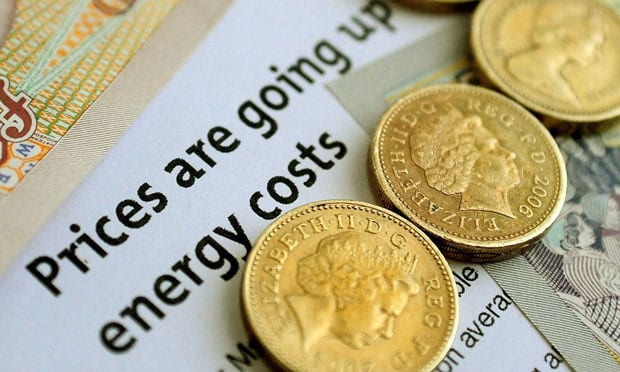'One of the aims of privatisation was to separate production and retailing of energy but that is not how it turned out.'

Prem Sikka is an Emeritus Professor of Accounting at the University of Essex and the University of Sheffield, a Labour member of the House of Lords, and Contributing Editor at Left Foot Forward.
Privatisation of the UK energy market has been a disaster. The market is controlled by corporations focused on profiteering, with little regard for long-term stability and energy security.
Just six companies, namely British Gas, EDF Energy, E.ON UK, npower, ScottishPower and SSE, control 77% of the UK household energy market. EDF energy is a subsidiary of the French-state controlled company Électricité de France. EON and npower are controlled from Germany. ScottishPower is controlled from Spain. The government encouraged smaller companies to enter the retail market. Until recently up to 70 companies competed in the retail market to sell energy to households and businesses.
One of the aims of privatisation was to separate production and retailing of energy but that is not how it turned out. For example, EDF owns and manages a number of power generating sites and is also a big retailer. This creates opportunities for mega profits.
Weak regulation has encouraged profiteering and neglect of investment. In the last decade, the big six energy companies have paid £23bn in dividends, equivalent of 82% of pre-tax profits and six times their corporate tax bill. Vast amounts of money have been exported, which in a publicly-owned scenario would have been spent in the UK to stimulate the economy and/or reduce pressure on household budgets.
The UK lacks gas and electricity generation capacity and has to rely upon imports from Belgium, France, Ireland, the Netherlands, Norway, Russia and elsewhere. Uncertainties around supplies could be managed by having good storage facilities but they have been reduced as companies have boosted profits by reducing inventories. As a result, the UK is highly exposed to price shocks. For example, the UK has around nine terawatt hours of stored gas reserves, compared to 168 in Italy, 151 in Germany and 117 in France. The UK reserve is around 2% of annual demand, compared with 25% to 37% in European competitors.
With unexpected price rises and higher post-Covid demand around 25 energy companies have gone bust in the last three months alone. Many more are teetering. This will increase the market power of the big six companies and their ability to extract higher profits from consumers.
The list of bankruptcies includes Bulb Energy, the seventh largest energy retailer with 1.7 million customers. Normally, the customers of a collapsed company are transferred to another supplier but with rocketing wholesale prices others do not want to take-over its contracts. So Bulb has been placed into ‘special administration’ i.e. it is effectively nationalised and is operated by the regulator, the Office of Gas and Electricity Markets (Ofgem). The government is providing around £1.7bn to ensure supplies.
Ofgem is required to focus upon energy security and stability, but has failed. One of its duties is to check that “licence holders are able to finance the activities”. It has failed dismally.
Consider the case of Bulb Energy which was formed in 2014 with share capital of only £100. By August 2016, it amassed losses of £763,287. By March 2017, the accumulated losses increased to £2,747,998, suggesting a major problem with its business model.
Its final accounts for the year to 31 March 2020 show a dire state of affairs. Its share capital was still £100. Therefore, Bulb had virtually no capacity to absorb losses or unexpected market shocks. It never made a profit and its accumulated losses ballooned to £223m. It had tangible assets of £1m and a £54m bank loan guaranteed by the parent company Simple Energy. It owed £466m to its suppliers. It is hard to see how banks would continue to provide funding for a serial loss-maker.
Other than its two directors, the company has no direct employees. However, its parent company had 510 employees (203 in 2019), including four directors. Presumably, they must have performed all the day-to-day tasks. One consequence of this is that their salaries would be booked by Simple Energy and thus understated the losses of Bulb Energy.
Bulb’s accounts were prepared on the basis that it was a going concern, a dubious assumption. Its director said that the parent company provides financial support. The difficulty is that Bulb’s parent company Simple Energy, is itself teetering with debts of £550m at the end of March 2020, rising to between £600m and £1bn in the subsequent 18 months. For a fee of £279k auditors BDO went along with the directors’ assertions and gave Bulb a clean bill of health. Now both Bulb and Simple Energy are in administration.
The case of Bulb Energy shows that Ofgem failed to discharge its duties. Bulb had high leverage, ultra low share capital; high losses and its parent company lacked the financial strength to underwrite its operations. Yet Ofgem and auditors considered the company to be a going concern.
Privatisation of energy has created rip-off practices, a trail of bankruptcies, energy insecurity, confusing tariffs and huge price rises. Public ownership of the industry is a first necessary step in ending insecurity and profiteering, and redirecting the industry to focus upon the long-term and serving the people.
To reach hundreds of thousands of new readers we need to grow our donor base substantially.
That's why in 2024, we are seeking to generate 150 additional regular donors to support Left Foot Forward's work.
We still need another 117 people to donate to hit the target. You can help. Donate today.



